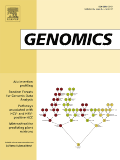
GENOMICS
Scope & Guideline
Illuminating the Path of Genetic Innovation
Introduction
Aims and Scopes
- Genomic Characterization and Analysis:
This area includes studies that focus on the sequencing and annotation of genomes across various organisms, revealing insights into their structure, function, and evolution. - Transcriptomic Studies:
Research in this scope investigates the expression profiles of genes under various conditions, utilizing RNA sequencing technologies to elucidate gene regulation and function. - Functional Genomics:
This area encompasses the functional analysis of genomic elements, including coding and non-coding RNAs, to understand their roles in biological processes and diseases. - Comparative Genomics:
Studies in this category compare genomic data across species to identify evolutionary trends, gene function conservation, and adaptive responses to environmental changes. - Genomic Applications in Agriculture and Medicine:
This includes research that applies genomic insights to improve crop traits, livestock production, and human health, focusing on genetic diversity, disease resistance, and therapeutic targets. - Bioinformatics and Computational Genomics:
The journal promotes developments in computational tools and methodologies that facilitate the analysis of large-scale genomic data, enhancing our understanding of complex biological systems.
Trending and Emerging
- Multi-Omics Integration:
Research that integrates genomic, transcriptomic, metabolomic, and proteomic data is increasingly popular, as it provides a more comprehensive understanding of biological processes and disease mechanisms. - CRISPR and Gene Editing Technologies:
Studies utilizing CRISPR and other gene-editing technologies are on the rise, reflecting the technology's potential for functional genomics and therapeutic applications. - Long Non-Coding RNAs (lncRNAs):
There is an increasing recognition of the roles of lncRNAs in gene regulation, leading to a surge in research exploring their functions and mechanisms in various biological contexts. - Environmental Genomics:
Research focusing on the genomic responses of organisms to environmental stressors is gaining traction, particularly in the context of climate change and ecological adaptation. - Synthetic Biology and Genomic Engineering:
The field is expanding with studies aimed at engineering organisms for specific purposes, including biofuel production, bioremediation, and enhanced agricultural traits. - Microbiome Genomics:
As the understanding of the microbiome's impact on health and disease grows, studies exploring the genomic aspects of microbial communities are increasingly prominent.
Declining or Waning
- Classical Genetic Mapping:
Research focusing on traditional genetic mapping techniques has seen a decrease as more sophisticated genomic technologies, such as whole-genome sequencing, have become prevalent. - Single Gene Studies:
There is a noticeable shift away from studies concentrating on individual genes towards more integrative approaches that consider the roles of entire gene networks and pathways. - Basic Model Organism Studies:
As the field evolves, there is less emphasis on classical model organisms in genomics, with a growing interest in non-traditional organisms that may provide novel insights into complex biological questions. - Population Genetics without Genomics Integration:
The integration of genomics into population genetics has overshadowed traditional population studies that do not utilize genomic data, leading to a decline in publications in this area.
Similar Journals

GENOME
Exploring the Depths of Genomic ScienceGENOME is a leading peer-reviewed journal published by Canadian Science Publishing, dedicated to advancing the field of genetics, biotechnology, and molecular biology. With a strong commitment to disseminating high-quality research, GENOME has earned a reputable spot in the academic community, boasting a Q2 classification in Biotechnology and Medicine (miscellaneous), and a Q3 rank in Genetics and Molecular Biology for 2023. The journal, identified by its ISSN 0831-2796 and E-ISSN 1480-3321, publishes innovative studies that span from 1987 to 2024, ensuring a rich historical context while addressing contemporary challenges in the field. Researchers and professionals are encouraged to contribute and engage with content that shapes the landscape of genetic research. Although the journal does not currently provide open access, it remains a vital resource for those committed to the exploration of genomic sciences, making it an essential read for both seasoned researchers and students alike.

FUNCTIONAL & INTEGRATIVE GENOMICS
Advancing the Frontiers of Genomic UnderstandingFUNCTIONAL & INTEGRATIVE GENOMICS, published by Springer Heidelberg, is a leading journal in the fields of genetics and molecular biology. Established in 2000, it serves as a pivotal platform for advancing our understanding of genomic functionality and integration, making significant contributions to both basic and applied research in genetics. With a robust impact factor and a ranking in the Q3 quartile for Genetics and Q2 for Medicine (Miscellaneous), the journal aims to publish innovative research that explores the relationships between genomic data and biological functions, appealing to a diverse audience of researchers and professionals. Although it operates under a subscription model, the journal's extensive archives remain a valuable resource for academics seeking to stay abreast of the latest findings and methodologies in genomics. As the field evolves, FUNCTIONAL & INTEGRATIVE GENOMICS remains committed to fostering scholarly dialogue and the dissemination of groundbreaking studies that influence future research trajectories.

Genetics Research
Advancing Knowledge in Genetics and Molecular BiologyGenetics Research, published by HINDAWI LTD, is a distinguished open access journal that has been at the forefront of genetic studies since its inception in 1960. With the transition to open access in 2019, this journal has expanded its accessibility, fostering knowledge dissemination across the global scientific community. Operating out of the United Kingdom, it provides a platform for innovative research in the fields of genetics and molecular biology, encompassing a broad range of topics that are highly relevant to medical sciences. As of 2023, it holds a Q4 classification in Genetics and a Q3 classification in miscellaneous Medicine, reflecting its ongoing commitment to scholarly excellence amidst shifting academic landscapes. While the journal's H-index remains unlisted, its indexed ranking within Scopus, with a rank of #325/328 in the Genetics category highlights the challenges ligated to its niche audience. Nevertheless, it serves as a crucial resource for researchers, professionals, and students eager to contribute to and stay informed on the latest genetic research trends and breakthroughs.

CURRENT GENETICS
Exploring Innovations in Genetics and MedicineCURRENT GENETICS is a prestigious journal published by SPRINGER, dedicated to advancing the field of genetics through the dissemination of high-quality research. With a notable impact factor and ranking in the Q2 category for both Genetics and Medicine (miscellaneous) as of 2023, it firmly establishes itself as a significant resource for the academic community. The journal’s comprehensive scope explores the latest findings in genetic research, along with accompanying interdisciplinary studies, providing a platform for researchers to share innovative ideas and methodologies. ISSN: 0172-8083, E-ISSN: 1432-0983, stands testament to its commitment to scholarly excellence. While Open Access options are not currently available, CURRENT GENETICS remains accessible to a broad audience, promoting a rich exchange of knowledge that supports the vast and evolving discipline of genetics. Since its inception in 1979 and through its converged years till 2024, this journal has played a crucial role in confronting scientific challenges and promoting advancements in genomic medicine and molecular biology. As such, it is an essential read for researchers, professionals, and students keen to remain at the forefront of genetic research.

Annual Review of Genomics and Human Genetics
Illuminating the Pathways of Molecular BiologyAnnual Review of Genomics and Human Genetics, published by ANNUAL REVIEWS, represents a pivotal platform in the field of Genetics and Molecular Biology. With an impressive impact factor reflecting its high citation rate and scholarly influence, this journal is renowned for its authoritative reviews that synthesize current research across genomics and human genetics. Highlighting its Q1 category rankings in both Genetics and Clinical Genetics, as well as its ranking within the top tiers of Biochemistry and Genetics, the journal stands out as a leading resource for researchers, professionals, and students eager to stay abreast of groundbreaking developments in these rapidly evolving fields. While not currently an open access journal, its rigorous peer-review process ensures the highest standards of scientific integrity. Researchers can access comprehensive reviews that delve into both fundamental genetics concepts and cutting-edge discoveries, making it an essential resource for advancing understanding in human genetics and its applications.

Briefings in Functional Genomics
Empowering Researchers with Cutting-Edge FindingsBriefings in Functional Genomics, published by Oxford University Press, serves as a crucial academic resource in the fields of biochemistry, genetics, and molecular biology. With an ISSN of 2041-2649 and an E-ISSN of 2041-2657, this esteemed journal explores innovative research and developments in functional genomics, with a commitment to advancing our understanding of genetic processes and their implications in health and disease. Ranking in the Q2 quartile for both Biochemistry and Genetics, and occupying a prominent Q1 status in the domain of interdisciplinary Medicine, the journal is positioned as a leading platform for researchers seeking to disseminate their findings to a global audience. Although it does not currently offer open access options, its accessibility through institutional subscriptions and its esteemed impact factor underscore its importance in the research community. Covering converging topics from 2010 to 2024, Briefings in Functional Genomics not only keeps pace with the rapidly evolving landscape of genomics but also stimulates collaboration and dialogue among scientists and industry professionals alike, making it an indispensable tool for researchers, practitioners, and students eager to engage with cutting-edge genomic science.

NAR Genomics and Bioinformatics
Transforming Data into Insightful Biological NarrativesNAR Genomics and Bioinformatics, published by Oxford University Press, is a leading open-access journal that has been at the forefront of research in genomics and computational biology since its inception in 2019. With an impressive impact factor and a consistent ranking in the Q1 category across multiple fields—namely Applied Mathematics, Computer Science Applications, Genetics, Molecular Biology, and Structural Biology—this journal stands as an influential platform for disseminating innovative findings and methodologies. Researchers and professionals have the opportunity to engage with high-quality, peer-reviewed articles that reflect the latest advancements in both theoretical and applied aspects of bioinformatics. The journal's commitment to open access ensures that groundbreaking research is accessible to a global audience, fostering collaboration and knowledge sharing within the scientific community. The country of publication is the United Kingdom, with a dedicated editorial team striving to maintain the highest standards of academic excellence.

BMC Genomic Data
Advancing the frontier of genomic research.BMC Genomic Data is a pioneering open-access journal dedicated to the dynamic field of genomics and health informatics, published by BMC, a renowned leader in scientific publishing based in the United Kingdom. Since its inception in 2021, the journal has established itself as a valuable resource for researchers, professionals, and students, providing a platform for the dissemination of high-quality genomic data research. With a focus on advancing knowledge in both genetics and health informatics, BMC Genomic Data holds a Q3 ranking in both categories as of 2023, indicating its growing influence and relevance in the scientific community. The journal has an impressive entry into the competitive landscape of academia, ranking #55 in the Medicine & Health Informatics category and #173 in Biochemistry, Genetics and Molecular Biology, reflecting its commitment to publishing impactful research. By offering an open-access model, researchers are encouraged to disseminate their findings widely, contributing to the ongoing dialogue in genomics. For those looking to stay at the forefront of genomic research and data analysis, BMC Genomic Data is an essential resource that promotes innovation and collaboration across disciplines.

CURRENT GENOMICS
Transforming genetic research into medical breakthroughs.CURRENT GENOMICS is a premier journal published by Bentham Science Publishers that focuses on the expansive field of genomics, including both clinical and molecular genetics. With the ISSN 1389-2029 and E-ISSN 1875-5488, this esteemed journal has been disseminating significant scientific insights since its inception in 2000 and continues to contribute to the field through 2024. Based in the United Arab Emirates, CURRENT GENOMICS boasts a Q3 ranking in both the genetics and clinical genetics categories for 2023, reflecting its growing impact in the scientific community. Although not an open-access journal, it provides valuable content that supports researchers and professionals in navigating the complexities of genetic research and its applications. By publishing original research articles, reviews, and case studies, CURRENT GENOMICS aims to foster a deeper understanding of genomic science and its implications for medicine, thus playing a critical role in the advancement of genetics and biomedical research.

GENES & GENETIC SYSTEMS
Connecting Researchers Through Open Access KnowledgeGENES & GENETIC SYSTEMS, an esteemed journal published by the Genetics Society of Japan, serves as a vital platform for the dissemination of innovative research within the fields of genetics, molecular biology, and medicine. Established in 1996 and based in Mishima, Shizuoka, Japan, this journal has actively contributed to the academic community, fostering collaboration and knowledge sharing among researchers and professionals. The journal’s impact can be seen through its category quartiles, which reflect its position in Genetics, Molecular Biology, and Medicine, and while it currently ranks in Q4 in Genetics and Q3 in Medicine (miscellaneous), it is poised for growth as it continues to publish pivotal studies. With a commitment to open access, GENES & GENETIC SYSTEMS ensures that research findings are freely accessible to the global scientific community, promoting a more inclusive approach to knowledge distribution. This journal is essential for students, researchers, and professionals seeking to stay informed of advancements in genetic research and its implications for the broader field of medicine.